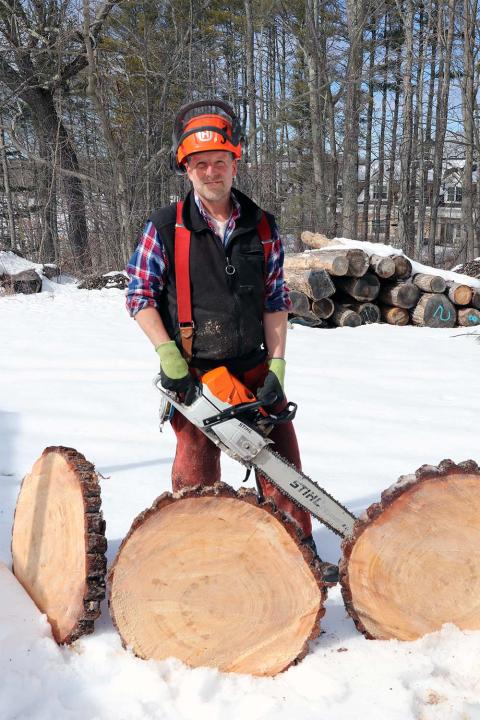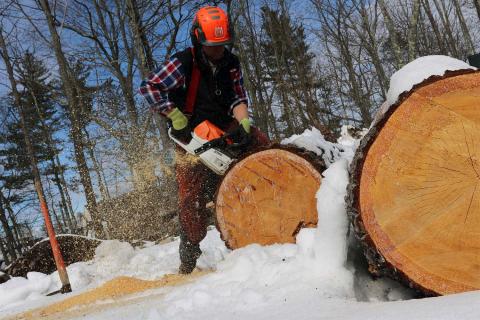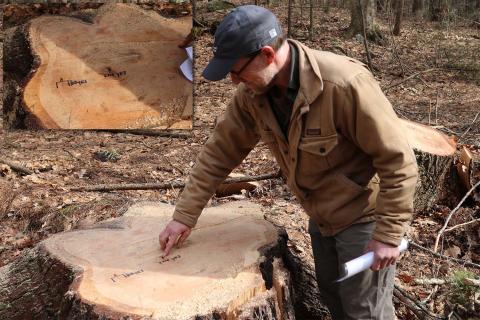
UNH woodlands manager/land-use coordinator Steve Eisenhaure started out studying a very different field from forestry. He initially earned a bachelor’s degree in business administration from the Paul T. College of Business and Economics (at the time known as the Whittemore School of Business and Economics). He later returned to UNH, earning a forestry technology degree from the Thompson School of Applied Science and a master’s degree in Forest Management from the College of Life Sciences and Agriculture (COLSA).
It was during his master’s education that he began working as the woodlands manager—a position that at the time was a graduate assistantship—in 2004. Two years later, the job became a full-time benefited position and Steve joined the University as a staff member. He’s served in that role ever since, creating and implementing land-use plans for UNH’s 22 woodland properties, which span the Seacoast and Central New Hampshire, range in size from a few acres up to 450-plus acres, and in total encompass about 3,800 acres of land.
In addition to overseeing the UNH Office of Woodlands and Natural Areas and teaching forest management at UNH, Steve has also been recognized for his work supporting and advancing New England’s forestry industry. In 2022, he was awarded the David M. Smith Award—granted to industry members engaged in research, teaching and/or the application of silviculture practices—by the New England Society of American Foresters.
Position: Land Use Coordinator, UNH Office of Woodlands & Natural Areas
Years with NHAES: Since 2006
Previous experience: Earned degrees in forestry technology and management from UNH.
Learn more
Steve Eisenhaure: I’m a New Hampshire-licensed forester and I manage all the forest activities across our properties. Some of the logging I do myself and some I work with contractors. I also manage the roughly thirty miles of trails and roads on the UNH properties, so there’s that recreational management aspect of my role as well.
You also create woodlands management plans for each property. What does creating those plans involve?
Steve: There are permanent forest inventorying plans on each of the properties, and those are managed on 10-year intervals. Every 10 years, we go back to each property and re-inventory (identify the trees, sizes and any forest health issues), and that’s what informs our plan there.
With these plans, I’m evaluating how to strategically manage the forests at each lot, as well as how that management practice fits in with any recreational, research and educational goals. That’s another area I help in too, is identifying the best properties to use for research and for applied teaching and outdoor classes.


UNH woodlands manager Steve Eisenhaure points out tree rings he's marked on a stump located in Durham's College Woods.
From left: UNH Woodlands manager Steve Eisenhaure cuts tree "cookies" at the UNH Sawmill. Steve points out tree rings he's marked on a stump located in Durham's College Woods.
What goes into creating a resource management plan at a UNH woodland lot?
Steve: We look at any health factors that the forest may have—that’s pretty important. We consider how fast the trees are growing, what the composition of the forest is and how that relates to the other properties.
It’s the same general set of objectives for all the properties and then some of the sites have things that are more prevalent, for example the significant recreational activity like you might find at College Woods—so that plays a role in our decision making.
What do you enjoy most about your job?
Steve: I like the people I work with and meet during my job. And I really appreciate that I get to spend a good portion of my work out in the woods. I enjoy working with students too—in the summers, I hire student workers and many of them stay on for a few seasons. And it’s great to see them begin their careers after graduating and working with me for a few seasons.
What are some of your hobbies and interests?
Steve: I enjoy flyfishing. After earning my undergraduate degree, I lived in Montana for a period and worked as a wildland firefighter. Every year or so I’ll travel back to go fishing with friends. My family is trying to visit all the national parks, so we’ll take summer trips to visit new parks around the country.